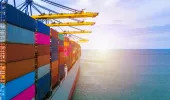The UK Ship Register is committed to quality shipping, which includes ensuring decent living and working conditions for all those working on board UK ships.
Seafarers on UK ships are protected by a range of legislation governing all aspects of their employment and their living and working conditions.
All ships that operate commercially (other than fishing vessels and ships of traditional build) are subject to UK legislation implementing the Maritime Labour Convention, 2006.
Find out more information below including links to further guidance on the National Minimum Wage, National Living Wage, Income Tax, and National Insurance.
National Minimum Wage and National Living Wage
Most workers in the UK over compulsory school age are entitled to be paid at least National Minimum Wage (NMW) rates. A worker is defined in the National Minimum Wage Act 1998, section 54 as someone who has entered into or works or worked under:
- A contract of employment, or
- A contract by which the individual undertakes to perform work or services personally for someone else. The contract can be expressed (whether agreed orally or in writing) or implied
Section 1 of the 1998 Act applies the National Minimum Wage to the work of someone who is working, or ordinarily works in the UK. Section 40 states that a worker is to be treated as ordinarily working in the UK if he or she works on a UK Flagged ship, unless this employment is wholly outside the UK or they are not ordinarily resident in the UK.
-
Income Tax and National Insurance
Guidance for seafarers on paying Income Tax and National Insurance contributions is published by the Mariners Unit, HM Revenue and Customs.
-
Guidance for shipowners regarding seafarers affected by Russia’s invasion of Ukraine
MIN 674 (M) provides guidance on the extension of Ukrainian Certificates of Competency (CoC) in line with IMO Circular Letter No. 4232/Add. 16 (please see annex A of this Notice) and an update on UK Flag State Endorsements (FSE) for holders of a CoC issued by Ukraine.


